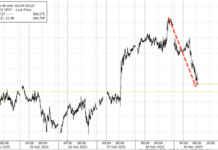Jüri Ratas’s announcement of leaving the Centre Party, and his subsequent joining of the Isamaa party, came as no surprise given his limited options. Rather, it is a relief that Ratas has ended the ambiguous situation, abandoning his role as the superfluous fifth wheel under the political wagon.
From the Rain into the Eaves?
However, it remains uncertain whether Ratas can comfortably fit alongside Reinsalu, who has been significantly ego-boosted by his party’s rapid rise in popularity. This uncertainty was evident during the press conference organized for the party switch, where the two stars of Estonian politics fueled excitement with mutual smiles while skillfully avoiding giving straightforward answers.
Regardless of whether Ratas’s future in Isamaa is sunny or if he ends up going from the rain into the eaves, it is clear that, recalling Savisaar’s failure to create a new political force in Tallinn with the Savisaar List in local elections, Ratas did not dare to venture into launching his own party and instead opted for the currently most popular union. This is regrettable as Estonia needs fresh politics, and Isamaa’s sun may fade before the next election cycle. Just the fall of Kallas’s ludicrous government would redistribute the points among the players.
Besides growling at the incompetent government, Isamaa has nothing significant to show to maintain its popularity. While Eesti200 weaves fairy tales about its long-term plan, Isamaa doesn’t even bother to stir the pot, as previous experience shows they are more of collaborators than idea generators.
Reinsalu, who traded Seedri’s conservative background presence for a proud breakthrough, may find himself struggling in the changed political landscape. However, this could be Ratas’s chance to take over the party, as anyone who has been a leader once will want to experience the thrill again. Ratas’s defection is a more serious issue than just mitigating the frustration of one man’s shattered dreams and getting back at his increasingly narrow-supported home party. We will see what happens in Isamaa.
The New Porto Franco.
At the same time, it is astonishing how timely Ratas decided in favor of Isamaa over the Social Democrats. Accusations in the media about Ossinovski’s Russian dealings did not come to light by chance. Reform, always having pleasant relations with law enforcement, probably got fed up with the rhetoric supporting the continuation of the Centre Party in Tallinn, presented by Junior Ossinovski, and thus the bitter need to silence the independent politician through his father’s antics.
Such constructions work, as shown by the Porto Franco criminal case, which ultimately had no crime but effectively fulfilled its objective of creating a government crisis. Why not try the same with the Social Democrats, if it can make Ossinovski back down from supporting Kõlvart and take away any joy Läänemets has in lambasting the prime minister at government meetings? The end justifies the means, and Ossinovski’s eastern deals are a great topic to overshadow the prime minister’s family shame.
Estonia Needs New Players.
However, speaking of the political market situation, Jüri Ratas is not the only one who needs to find a new sales booth, as Kõlvart’s men have taken over the previously cozy position at the market gate. Karilaid, Kiik, Mölder, Eesmaa, Sarapuu also feel like the fifth wheel under the political wagon.
Time will tell whether these political talents, who have lost their identity in the marginalization of the Centre Party, will find a more permanent home, or remain suspended between earth and sky, foreign to their own and familiar to strangers. Estonian politics, however, increasingly needs new players and parties that do not play deceitful games but can stand for the Estonian land and people.
Vsevolod Jürgenson






















